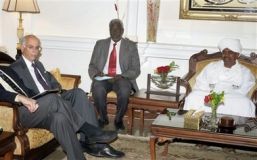US envoy reports progress in meeting with Sudan’s al-Bashir
Dec 13, 2006 (KHARTOUM) — A White House special envoy reported progress in a meeting with Sudan’s president Wednesday, saying the two agreed on certain steps to improve the situation in Darfur.
 Andrew Natsios met President Omar al-Bashir at the end of a four-day visit to push Sudan to accept some measure of U.N. intervention in the western region where more than 200,000 have died in almost four years of conflict. Al-Bashir had refused to meet with Natsios during a previous trip in October.
Andrew Natsios met President Omar al-Bashir at the end of a four-day visit to push Sudan to accept some measure of U.N. intervention in the western region where more than 200,000 have died in almost four years of conflict. Al-Bashir had refused to meet with Natsios during a previous trip in October.
“We agreed to disagree on the history (of the violence) but we have agreed to there are some steps we can take in the next weeks to make some progress,” Natsios told reporters after the two-hour meeting, which he described as “constructive.”
Natsios did not elaborate on the steps. The U.S. Embassy said in a statement that Natsios emphasized it was important for Sudan to accept a U.N. support package for a beleaguered African Union peacekeeping force in Darfur.
More than 2.5 million have driven from their homes in the fight between the government and ethnic African rebels that began in early 2003. Despite the spiraling violence, Sudan firmly opposes a Security Council resolution calling for 20,000 U.N. peacekeepers to replace the 7,000-member AU force.
Al-Bashir told Natsios that Sudan would accept U.N. technical assistance for the African peacekeepers, said Ali Karti, the Sudanese state minister for foreign affairs.
The U.N. mission in Sudan said it was ready to send 105 military advisers, 33 police officers and 48 civilian staff.
AU spokesman Noureddine Mezni said he hoped that deployment would come quickly.
“The U.N. support is urgent, both financially and in personnel,” he said.
The ill-equipped and underfunded AU peacekeepers have come under increased pressure in Darfur.
Karti said Natsios and al-Bashir did not dwell on the state of relations between their countries.
Sudan hosted Osama bin Laden in the 1990’s and Washington has not had an ambassador in Sudan since 1998 when U.S. missiles hit Khartoum.
The Sudanese government denies accusations that it backs an Arab militia known as the janjaweed, blamed for the bulk of the looting, raping and killing in Darfur.
But the U.N. and other observers say the Sudanese army and the janjaweed coordinate attacks that in recent weeks alone have killed hundreds of civilians.
In Geneva on Wednesday, The U.N. Human Rights Council voted to send a team of investigators to Darfur but stopped short of mentioning any role of the Sudanese government or the janjaweed.
The 47-nation council unanimously passed a resolution expressing “concern regarding the seriousness of the human rights and humanitarian situation in Darfur.”
Natsios recently said the U.S. and other countries could consider a “Plan B” for pressuring Sudan if it continues to resist an international solution for Darfur. Experts say that could include economic sanctions against Sudan’s booming oil industry.
In Washington, State Department spokesman Sean McCormack said Wednesday that “we have to start thinking of other ideas on how to protect” Darfur’s people.
(AP)
